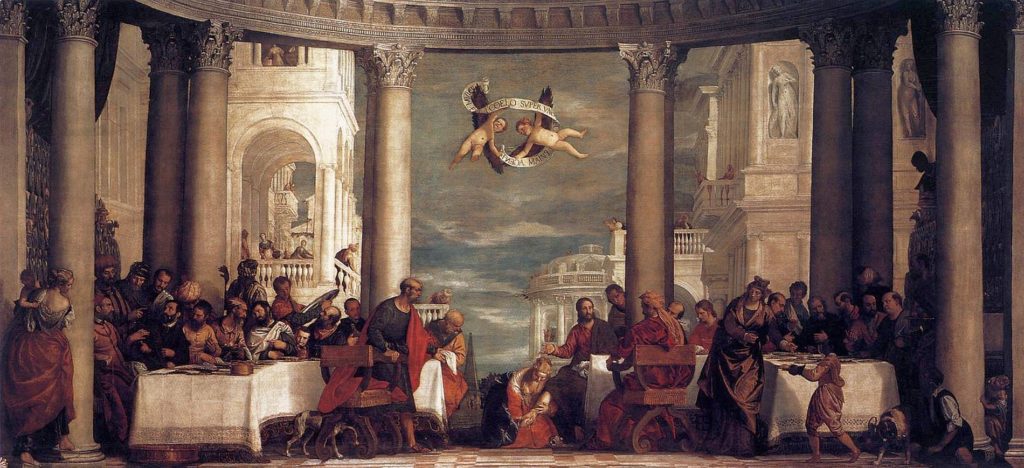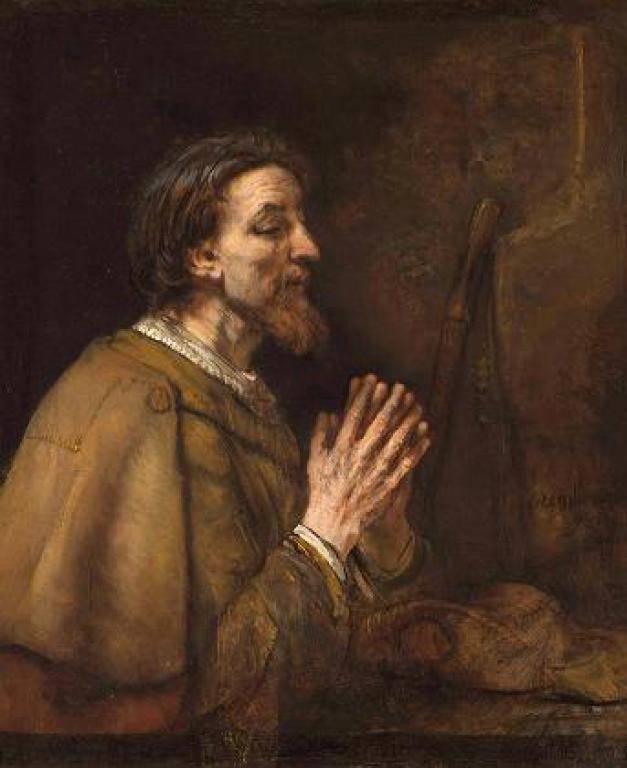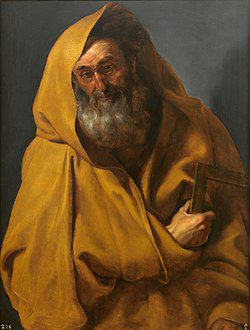We’ve just looked at testimonies of several witnesses to Jesus, risen in the flesh, in I have Seen the Lord. Here we will take a look at one witness converted by Jesus’ resurrection, James.

He frequently spent time with Jesus, heard His preaching, yet his name is not even mentioned in John’s Gospel. Was he was a doubter perhaps more skeptical than Thomas? Thousands heard the Lord preach on mountaintops, in homes, many synagogues and frequently in various public areas of the Temple.
How does one of more than five hundred witnesses to Jesus’ resurrection become so important to the first century church? Why is he hardly mentioned in the four Gospel accounts? And could 21st century Christians have missed the identity and influence of the Apostle leading the church in Jerusalem after Jesus’ ascension?
We’ll address some of this mystery later, but James’ familial witness is found in the important pastoral letter he wrote.
Letter of James
This won’t be a detailed look at the Epistle of James, but rather a study of the early church. You may want an answer to the same question I had (‘which James?’), but before we focus on our letter writer let’s take a quick look at a commentary on his letter.
James at a Glance
Source: Willmington's Bible at a Glance
This book offers sound advice for practical Christian living, examining such issues as prayer, steadfastness in trial, impartiality, demonstrating one’s saving faith in God by one’s service for God, proper control of the tongue, overcoming worldliness, and finally, exhortation to practice patience while awaiting the return of Jesus!
Bottom Line Summary
THIS NEW TESTAMENT BOOK IS THE PROVERBS AND AMOS OF THE OLD TESTAMENT.
Letter of James description from Willmington’s Bible at a Glance
No doubt you understand the nature of Proverbs and his proverb-like quotes from the letter may have been intended for memorization. This commentary evokes questions about the author’s identity, but anyone familiar with the prophets will appreciate James’ intent.
- The book of Amos, because of its uncompromising “in your face” rebuke of sin and hypocrisy!
Our own examination of James applies in this same way to our easy-grace church of this twenty-first century perhaps even more that the first century church to which James wrote his letter.
James, James, What’s in a name?
Ἰάκωβος
James, a servant of God and of the Lord Jesus Christ:
Gk for ‘James,’ James 1:1 CSB
To the twelve tribes dispersed abroad.
Greetings.
English translations of common names from Hebrew, Greek, Aramaic or other languages sometimes confuse our understanding of whose’s who in the Bible. We associate certain traits to people we read about in the Bible without really knowing much about then.
Ἰάκωβος translated as James, means “the supplanter.” You may recognize it – same meaning as “Jacob.” The greek root, Ἰακώβ, derives from the Hebrew roots: יַעֲקֹב עָקַב
The Lord God had made Jacob’s new name literally, Israel, meaning ‘God prevails’ – יִשְׂרָאֵל. And though we won’t go there now, let’s just mention the name of the father of Mary’s husband, Joseph, was also ‘Jacob.’
So this common name in its numerous variations seems to denote a VIP, regardless of what we call him or what works he achieves for the Lord.
James, and my other brother James
Those from my generation may recall a familiar chorus by Jim Croce.
They say you don't tug on Superman's cape.
You don't spit into the wind.
You don't pull the mask off that old Lone Ranger
And you don't mess around with Jim.
You may know a James like ‘Jim,’ but let’s dispense with some preconceived notions about the writer James. We certainly recognize the superlative contributions of more than one James to the establishment of the early church.
May I remind us that Jesus is the way, the truth and the life. Jesus came to justify sinners by faith. (The ‘American way’ is as fictional as Krypton and occasionally our arrogance spits into the wind of His great mercy.)
In some ways James should not be unmasked; for every Apostle gave the glory to Jesus, whose order will be restored through grace and truth. The identity behind the mask of the author of James may not be certain, but let’s peak at some thoughts of who some theologians believe he may be.
James the Great (Son of Zebedee)

‘The Great,’ that’s what we probably would have called him.
James, son of Zebedee was called James the Greater and sometimes, James the Elder. We all know the story of the influence his Jewish mother attempted to enhance his reputation in Jesus’ Kingdom.
Matthew 20:21-22
Then the mother of Zebedee’s sons approached him with her sons. She knelt down to ask him for something.
“What do you want? ” he asked her.
“Promise,” she said to him, “that these two sons of mine may sit, one on your right and the other on your left, in your kingdom.”
Yes, the Apostle, older brother of John, was a pretty strong guy, part of Jesus’ inner circle along with his younger brother and Peter. Just as Jesus had called Simon by the name Peter, which means ‘the rock,’ He called the two brothers, Boanerges or ‘Sons of Thunder.‘
Although James the Great, a leader among the twelve Apostles, would seem a logical choice as author to the letter, events suggest otherwise.
Acts 12:
About that time [during the reign of Claudius] King Herod violently attacked some who belonged to the church, 2 and he executed James, John’s brother, with the sword.
James the Great was martyred for the sake of Christ circa AD 44. Although James may be the earliest New Testament book written, the date was likely not until AD 45 in Jerusalem.
James the Less (Son of Alphaeus)

Matthew 10:2 These are the names of the twelve apostles: First, Simon, who is called Peter, and Andrew his brother; James the son of Zebedee, and John his brother; 3 Philip and Bartholomew; Thomas and Matthew the tax collector; James the son of Alphaeus, and …
This second James of the Twelve may have been called ‘the less’ because he was younger or smaller, but mostly to differentiate him from James Son of Zebedee, brother of John.
Although some have speculated he may have written the Epistle (letter), he is probably not its author.
James Half-brother of Jesus
The gospels mention this younger son of Mary during the three-year ministry of Jesus. He would likely have been in his twenties. However, this other son of Mary did not believe until after the resurrection.
Matthew 13:
54 Coming to his hometown, he began teaching the people in their synagogue, and they were amazed. “Where did this man get this wisdom and these miraculous powers?” they asked.
- 55 “Isn’t this the carpenter’s son?
- Isn’t his mother’s name Mary,
- and aren’t his brothers James, Joseph, Simon and Judas?
- 56 Aren’t all his sisters with us?
Where then did this man get all these things?” 57 And they took offense at him. But Jesus said to them, “A prophet is not without honor except in his own town and in his own home.”
58 And he did not do many miracles there because of their lack of faith.
Here we see witness of questions about Jesus’ brothers and sisters, although some false teaching of the early church denied this apparent family connection.
Commentaries generally agree that Jesus’ half brother led the church in Jerusalem. Additional scripture also points toward this converted brother of Jesus.
John 7:
Jesus Goes to the Festival of Tabernacles
It’s very public, the place for Jews to take time to worship the Lord. And festivals are a time when those in Galilee would have traveled to Jerusalem.
2 But when the Jewish Festival of Tabernacles was near, 3 Jesus’ brothers said to him, “Leave Galilee and go to Judea, so that your disciples there may see the works you do. 4 No one who wants to become a public figure acts in secret. Since you are doing these things, show yourself to the world.” 5 For even his own brothers did not believe in him.
Yes, skeptics. Even though others had already testified to Jesus’ miracles , the younger James and Joses did not believe. They no doubt had heard all the talk, but were in fact saying, ‘prove it.’
… he stayed in Galilee. 10 However, after his brothers had left for the festival, he went also, not publicly, but in secret…
12 Among the crowds there was widespread whispering about him. Some said, “He is a good man.” Others replied, “No, he deceives the people.” 13 But no one would say anything publicly about him for fear of the leaders.
Jesus’ brothers certainly would have been drawn into the debates in Nazareth which now they experience in Jerusalem.
Jesus Teaches at the Festival
14 Not until halfway through the festival did Jesus go up to the temple courts and begin to teach. 15 The Jews there were amazed and asked, “How did this man get such learning without having been taught?”
16 Jesus answered, “My teaching is not my own. It comes from the one who sent me. 17 Anyone who chooses to do the will of God will find out whether my teaching comes from God or whether I speak on my own.18 Whoever speaks on their own does so to gain personal glory, but he who seeks the glory of the one who sent him is a man of truth; there is nothing false about him…
Would you miss your own brother teaching, knowing the witnesses to miracles and claims that this familiar older brother (actually, half-brother) is the promised Messiah?
Probably not.
26 Here he is, speaking publicly, and they are not saying a word to him. Have the authorities really concluded that he is the Messiah?
Jesus and his brothers participated in the festival multiple days, further evidence that James fully knew everything that Jesus taught. For this reason he is later referred to as an Apostle, because he is witness to Jesus Incarnate (God in Flesh and Blood).
On the last and greatest day of the festival, Jesus stood and said in a loud voice, “Let anyone who is thirsty come to me and drink. 38 Whoever believes in me, as Scripture has said, rivers of living water will flow from within them.”
John 7:37-38 CSB
After His Brother’s Resurrection
The Apostle Paul essentially writes to the church the same gospel as James.
Paul’s First Letter to the Corinthians 15:
Now, brothers and sisters, I want to remind you of the gospel I preached to you, which you received and on which you have taken your stand. 2 By this gospel you are saved, if you hold firmly to the word I preached to you. Otherwise, you have believed in vain…
5 … and that he appeared to Cephas, and then to the Twelve.
Paul has already accounted for Jesus’ post-resurrection appearances to Peter and the Twelve Apostles. (Even Mathias may be counted here, a discussion for another time).
6 After that, he appeared to more than five hundred of the brothers and sisters at the same time, most of whom are still living, though some have fallen asleep.
Paul’s letter was written circa AD 55, while the letter of James was written ten years earlier, circa AD 45. Returning to Paul’s witness of those to whom Jesus appeared in the flesh after death:
7 Then he appeared to James, then to all the apostles, 8 and last of all he appeared to me also, as to one abnormally born.
Although some traditions conclude a writer other than the half-brother of Jesus, the authenticity of the letter of James and his firm scriptural leadership of the early church cannot be disputed. Like Paul, James preaches Christ crucified and risen; Jesus Lord, the One we serve and by the Holy Spirit He IS with us, before God the Father.
James, converted skeptic, as was Saul of Tarsus until Jesus appeared to him, writes to the church – all the believers. These letters inform and shape Christians in every place in the world until Christ returns again.
To be continued...


Leave a Reply